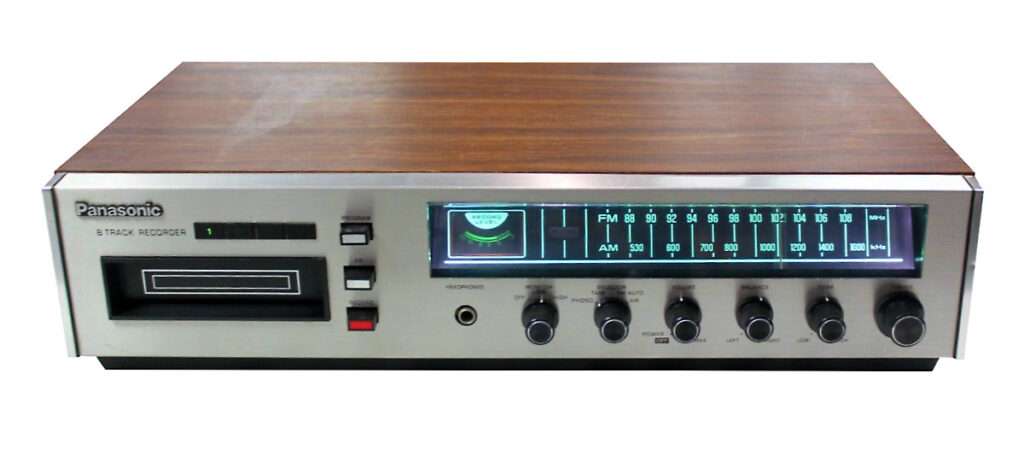The mighty 8-track tape player is often linked with lovers of the 1960s-1970s era. There are still reasons for people to buy these stereo players and recorders – for nostalgia and for daily use. Panasonic 8-track players were and are a leading example of the format due to their sturdy, durable and attractive qualities. Here’s a look at the types and models of some classic Panasonic 8-track units, and what they mean to collectors today.
Categories of Panasonic 8-track players
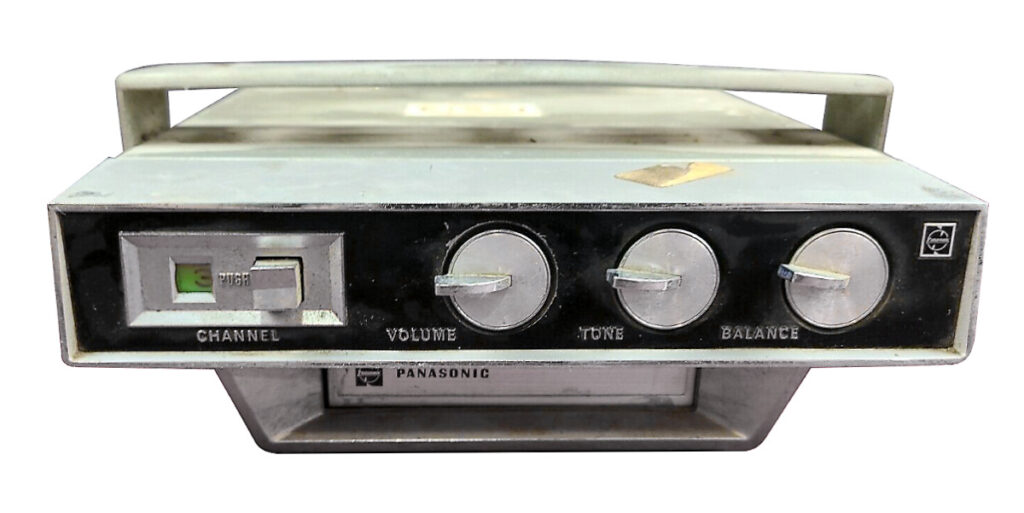
More on MegaMinistore: PlayTape Player: Super Rare Vintage Audio Equipment
Panasonic’s 8-track players for cars
Ford Motor Company ushered in the era of 8-track players in September 1965 via their Mustang, Thunderbird and Lincoln models. These initial decks were made by RCA, based on technology invented by Lear Jet leader Bill Lear. (The concept of the endless tape loop cartridge had been introduced years earlier to radio stations for playing pre-recorded promos and commercials.)
The arrival of 8-track players in cars was the first time ever that people could pick their own music while driving, beyond changing radio stations. What made 8-track tapes appealing in cars was the ability to hear hi-fidelity sound instead of a constant crackling radio signal. Since the 8-track tape player became an instant hit, other brands started manufacturing their own. These began appearing in various vehicle models. Panasonic had been an electronics brand for many years before it ventured into stereo audio components in the mid-sixties. Panasonic 8-track players for cars were among the brand’s earliest stereo audio components.
By the late seventies the 8-track tape was overshadowed in cars by the cassette, which was easier to store because of its smaller size and improved sound quality. Automobile Panasonic 8-track players will long be remembered for their innovative designs and superior sound quality.
Panasonic home 8-track units
Since 8-track tape players were such a big hit in cars, manufacturers began making models for the home as well. That way, people could listen to their growing 8-track tape collections just about anytime they wanted – at home or in the car.
Panasonic 8-track players and recorders for your home stereo setup are arguably the main focus of the marketplace today. It was here that Panasonic’s attention to detail and devotion to building high-quality components shines.
Quadraphonic 8-track tapes: A vintage 4-channel experience
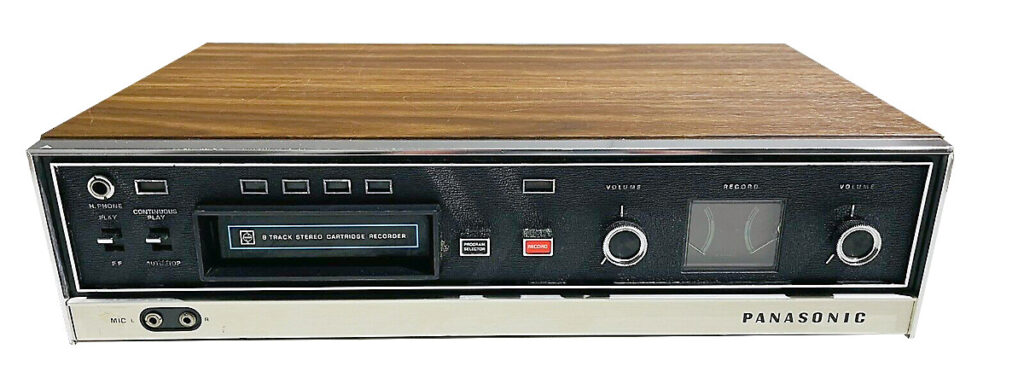
Note that in Japan, Panasonic is known as National. Look for either name when searching for Panasonic 8-track players for sale.
Popular Panasonic home 8-track deck models
Models RS801 through RS808 from Panasonic were popular for their modern designs and basic features. These models often have a suffix such as US or AUS. This is to differentiate the types of voltage needed for the machine, but operation and design is generally identical despite the suffix.
More on MegaMinistore: 8-track tape/cassette vintage adapters
- RS801 – This stereo player gave you the most basic features you could imagine from the early era of 8-track player development. You simply inserted the tape and selected the program. The only other button ejected the tape. Its silver face maintains its modern look after all these years.
- RS802 – This basic 8-track tape player continued the emphasis on simplicity. It had essentially the same basic features as the first model. Four lights on the front panel indicated which of the four programs was playing.
- RS803 – This player/recorder included microphone and headphone jacks. Since it included RCA outputs, this unit could be integrated with a standard stereo system in the 1970s. It comprised two opposing VU meters on the front panel, along with basic controls.
- RS804 – Another basic model, the 804 allowed you to insert the tape, select the program and eject the tape. Other than the eject button, it looked nearly identical to the 802 model.
- RS805 – The green VU meter gave this recorder/player an intriguing appearance, encompassed in the surrounding black panel with controls. Features included fast forward, continuous play and sliders for left and right volume. Since it included left and right RCA line in and line out connectors, it was useful for recording from other types of stereo equipment.
- RS806 – With a wider frequency response range from 50Hz to 15kHz, this unit delivered a crisp high-quality sound. It was useful for recording because it contained both a record/playback head and an erase head. This feature allowed for cleaner editing. If you’re looking to buy blank 8-tracks and make your own carts, a good-condition example of this model would serve you well.
- RS807 – The mode selector on the left of this basic 8-track playback unit gave you the option of continuous play or repeat. It also had a “tape run” indicator in the upper right corner.
- RS808 – This player/recorder model moved toward sleekness and sophistication. The side-by-side VU meters were prominent, taking up more space than any other feature. The left and right channels had separate volume control knobs. The deck included a time counter at the top and a pause button next to the record button.
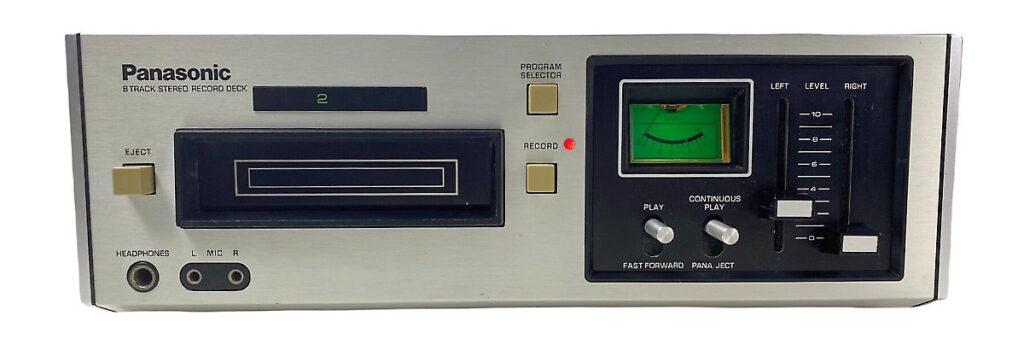
Besides this line of models, plenty of other Panasonic 8-track players are easily available. You can find units that incorporate turntables, and the nicest of the nice can be pretty expensive. Look out especially for working players that have been tested and repaired.
More on MegaMinistore: 4-track tape vintage player antique units
Portable Panasonic 8-track players
The 8-track tape deck took the form of boomboxes by the mid-seventies, allowing music lovers to take music with them anywhere. These portable players often also came with AM/FM radio. In 1974, Panasonic introduced its RQ-830S model – the legendary “Dynamite 8-Track Tape Player.” It was popularized by TV commercials such as a 1975 ad featuring TV star Jimmie Walker, who was famous for using the term “dy-no-mite” in his act.
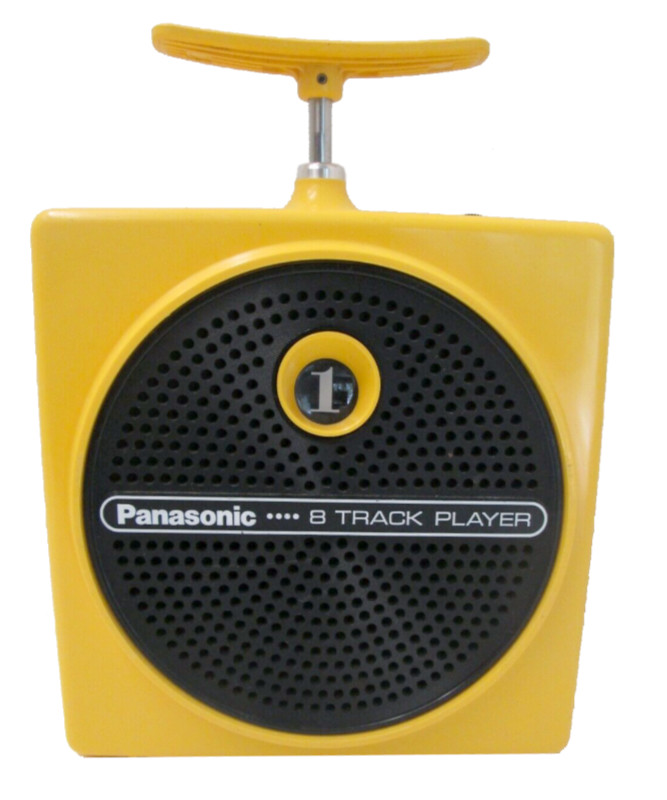
This battery- or AC-operated model was part of the successful TNT series. These portable 8-track decks stood out because they were available in a range of bright colors: red, blue and yellow. (Many 8-track enthusiasts try to get one working version of each one). The handheld boxes have a black speaker in the middle. The cartridges were inserted on the side, and to change programs you’d hit the plunger.
It was the perfect marriage of design and fun. The Panasonic TNT “plunger” 8-track player was the hot gadget kids wanted. Even though the TNT players only had two controls (volume and selection), they were considered innovative designs in the seventies.
Browse 129 current Panasonic 8-track players for sale offers here
Quadraphonic Panasonic 8-track players
The concept of quadraphonic sound was a trend for awhile in the seventies. Quadraphonic 8-track tape players were announced by RCA in April 1970. Ford was an early promoter of this new technology, but the trend only lasted through the mid-seventies.
In 1970 the Panasonic 8-track model RS862S offered quadraphonic sound. Other models followed from Panasonic, and to truly have a vintage stereo system tricked out, you’ll need a quad 8-track player that is in solid working order. Luckily, Panasonic made their players strong enough that this is entirely possible these days.
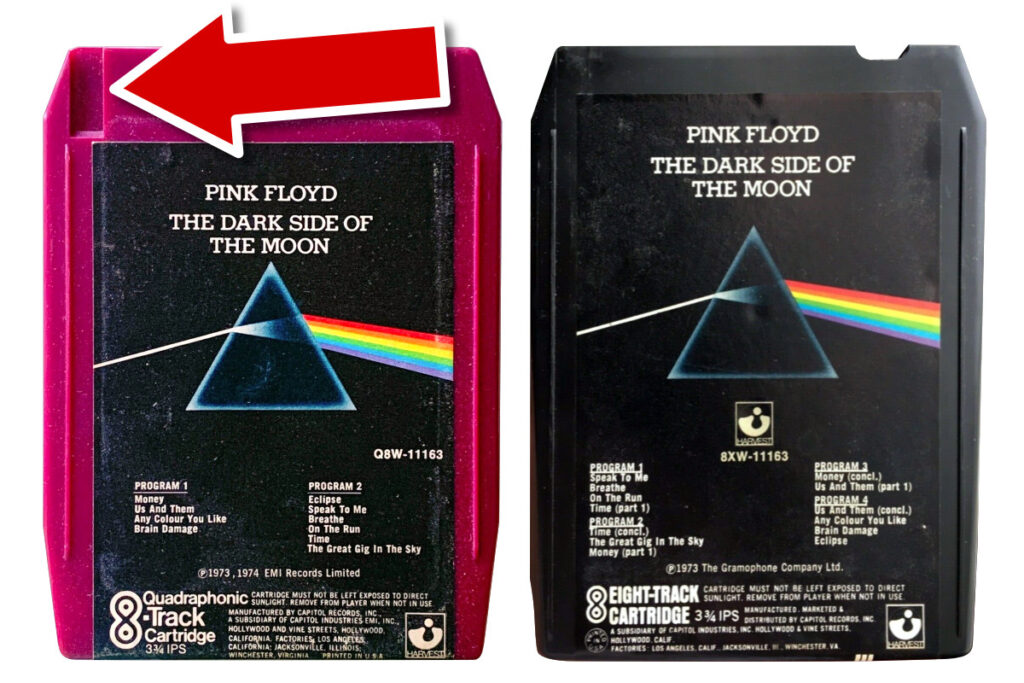
Quadraphonic 8-track tapes sound was designed to hear music on four speakers (instead of stereo’s two) as an attempt to simulate a live performance. The idea was you could hear different instruments from different parts of the room or car. Since the music industry didn’t move deeply in this direction, the musical selections for this format remain limited. Interestingly, the first karaoke machine called Juke-8 was based on the quadraphonic 8-track tape deck and was released in 1971.
For musicians who wanted to record their music or those who wanted to transfer albums to tape, the Panasonic 8-track model RS862S could record and play quadraphonic sound. It also was equipped with AM/FM radio. There were also quadraphonic players for cars, offering a wonderful experience for those lucky enough to have four speakers, some quad 8-tracks, and such a player for their car. (Probably 100% of quadraphonic 8-track players also play stereo tapes.)
Panasonic 8-track players today
Looking back on Panasonic 8-track players and recorders evokes memories of The Beatles, Jimi Hendrix, Led Zeppelin, Stevie Wonder, The Eagles and Fleetwood Mac. The marketplace is usually chock full of great Panasonic/National 8-track players of various types and in various conditions. Hunt for the perfect one for your needs, because there is a lot of variety from this company that put so much effort into 8-track equipment that can still work and sound great today.
